When one thinks of science fiction and fantasy protagonists, one thinks of figures like Morgaine (Gate of Ivrel), Essun (The Fifth Season), Cordelia Naismith (Shards of Honor), Beatrice Clayborn (The Midnight Bargain) and Anna Tromedlov (Hench). A casual glance suggests these are generally women, which only makes sense. The majority of fiction readers are women and of course they want relatable characters.
However, it’s entirely possible to write a book with a strong male protagonist at its centre (“strong” as in striking, resolute, and/or determined, not as being able to dead-lift surprising amounts of weight, of course—assessing male characters purely in physical terms would be offensively reductive). Consider these five recent examples:
Witchmark by C. L. Polk (2017)
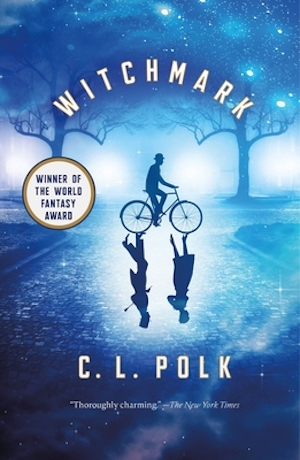
Neither a lamentable childhood nor a brutal war managed to kill Doctor Singer. Singer hopes his dramatic past will remain just that—past—which should allow him to concentrate on healing people. His efforts to play good Samaritan have unfortunate consequences when Singer tries to save the life of dying journalist Nick Elliott. Before he dies, the dying man as much as calls Singer a witch in the hearing of one Tristan Hunter.
The laws of Singer’s homeland, Aeland, are very clear where witches are concerned. Known witches are dispatched to asylums upon detection. Should Hunter reveal what he heard, Singer’s career as a doctor and life as a free man would be over. However, Hunter is not from Aeland and has no reason to expose Singer. What Hunter would like is to discover who killed Elliott and why. This is a matter with which Singer can aid Hunter… although the consequences of their quest may be as calamitous as being exposed as a witch.
***
King of the Rising by Kacen Callender (2020)
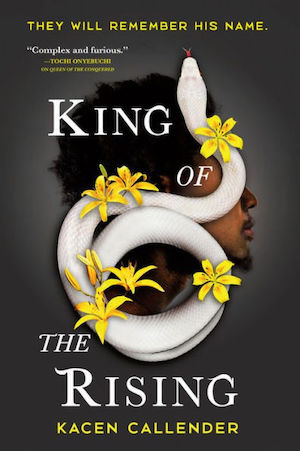
Loren Jannik would seem to be favoured by fortune. He has one of the most powerful magical gifts or “krafts”: the ability to copy other people’s magic. His people look to him as a leader. This is not, however, the boon it might seem. His people were invaded and enslaved by the Fjern in centuries past, and the Fjern have a policy of murdering every one of Jannik’s people who display kraft (strong or weak) as well as any Islander who displays, as Jannik does, rebellious tendencies. Jannik’s other useful knack—that of surviving certain death—is well documented. It has been tested so frequently.
Eventually Fjern arrogance facilitates wide-spread slave uprisings. For the moment, Jannik and those he leads are free. And yet…the uprising hasn’t extended to distant islands; the Fjern’s military forces are numerically superior to the rebels; and Jannik’s leadership is questioned by those who feel they should be in charge.
It seems as if Jannik’s gift for surviving no-win situations may be very helpful in the immediate future.
***
The Return of the Thief by Megan Whalen Turner (2020)
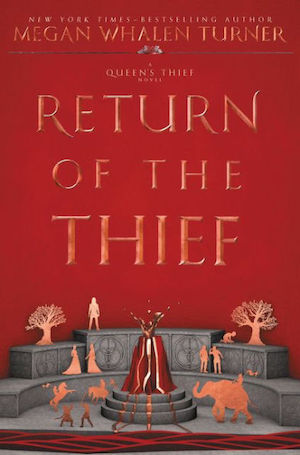
Born physically disabled and non-verbal, Pheris would have been exposed or smothered at birth save for mercy born out of spite. Her mother sees that he is spared so that Pheris can be a living embarrassment to Pheris’ grandfather Baron Erondites. As a child, Pheris realized there were more dangerous alternatives than being considered beneath contempt. He therefore concealed just how intelligent he is.
To the Baron, Pheris is an expendable chip, suitable for handing over to High King Gen to serve as a hostage/attendant. Gen is more insightful than the Baron. Perceiving that Pheris is actually quite smart, Gen sees to Pheris’ education. Ensconced at court, Pheris is given a front row seat to Peninsular politics and the final struggle that will either see the Peninsula united in defence or consumed by the vast Mede Empire.
***
A Broken Darkness by Premee Mohamed (2021)
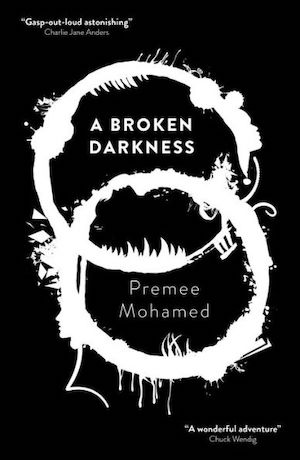
In the year and a half since wunderkind Johnny Chambers and her best friend Nick Prasad saved the world from the Dimensional Anomaly, Nick has painstakingly reconstructed his life without Johnny. Not because Johnny died. Johnny is alive and well, something hundreds of millions of victims of the Anomaly cannot say. Rather, it’s because of what Nick learned about Johnny, including but not limited to Johnny’s role in facilitating the invasion of our world by Cosmic Horrors.
Said horrors were vanquished in the traditional manner. They should not be able to try another attack until the next time the Stars are Right. However, the outbreaks of body-warping horrors suggest that despite the Stars being Wrong, humanity’s enemies are somehow infiltrating our reality. For humanity to survive, some defence must be found and for that to happen, Nick is going to have to accept the unthinkable: rekindling his alliance with Johnny.
***
Winter’s Orbit by Everina Maxwell (2021)
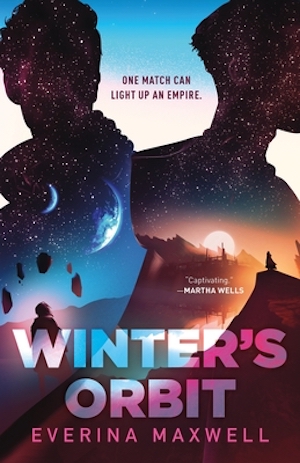
Prince Kiem understands full well why his grandmother the Emperor has never trusted the prince with any task of importance. The prince himself would admit he can be irresponsible, impulsive, and just a bit dim. But he’s alive and available for a strategic marriage. He is ordered to marry the fiancé of his dead cousin Taam: Count Jainan.
The marriage symbolizes the bond between Kiem’s country of Iskat and Jainan’s Thea. It matters little which high-ranking Iskatian marries Jainan. There’s just one hitch: both Iskat and Jainan would really like to know who murdered Taam. If they don’t find out, there might be another alliance-disrupting murder.
***
Of course, I could have chosen other examples. There are literally dozens of books that feature strong male protagonists! You may have your own favourite examples. Feel free to mention them in the comments.
In the words of Wikipedia editor TexasAndroid, prolific book reviewer and perennial Darwin Award nominee James Davis Nicoll is of “questionable notability.” His work has appeared in Publishers Weekly and Romantic Times as well as on his own websites, James Nicoll Reviewsand the Aurora finalist Young People Read Old SFF (where he is assisted by editor Karen Lofstrom and web person Adrienne L. Travis). He is a four-time finalist for the Best Fan Writer Hugo Award and is surprisingly flammable.










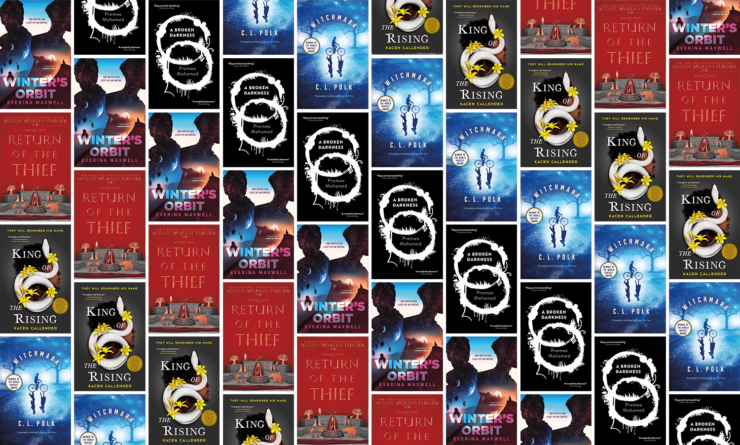
Prince Corwin of Amber, of course. It’s his superpower.
More contemporary:, Temur from Range of Ghosts is very much a Determinator who just keeps on going.
Literally dozens? Perhaps something of an underestimate if you go back more than a couple of years?
That said, I’d marry Prince Kiem, he’s a sweetie :)
Andrew Jackson Libby is an interesting case – his work as a construction worker, and later as a vital part of the Howard Families’ departure from the solar system shows his strength of character; of course, a later character turn will make Libby more relatable to the majority of readers.
Gully Foyle. Well, obviously.
How can we possibly overlook Cordelia Naismith Vorkosigan’s son, Miles? Doesn’t give up easily doesn’t even begin to describe this pint sized determinator!
Looking over the suggestions in the comments, I think it may be worth noting that all of the authors in James’s list are female or nonbinary. (There may be other criteria that I’m missing, as I’m not familiar with all of the books or authors in question.)
Gee how about ever protagonist in a sci-fi or fantasy book. It’s the general trope-they have to go beyond their limits to overcome the bad stuff. Really would it be much fun to read a book where the protagonist didn’t have to not give up because they were powerful enough from the start? It would be like a video game on easy.
6: I wouldn’t read anything into that. There are a number of male authors I could have used: Judith Merril’s husband Fred, for example, had a warmly regarded novel called Gateway whose male protagonist, Robinette Broadhead, prevails despite being stuck with alien equipment with no users manual. Joan D. Vinge’s former husband Vernor’s A Deepness in the Sky details some adventures of a high ranked male, Pham Nuwen, and of course Diane Duane’s husband Peter wrote about Tsar Ivan Khorlovskiy in his Prince Ivan.
There’s a set of books about men close to the throne with significant physical disabilities in cultures that place no value on handicapped people who manage nevertheless to do fairly well for themselves, I, Claudius being a historical example. I don’t know if either Bujold or Turner had the Emperor Claudius in mind when they penned Miles and Pheris, respectively. Both of their characters do somewhat better than poor Claudius, if only in the sense of neither marrying Agrippina nor adopting Nero.
@9: Miles probably won’t adopt Nero because the Nero equivalent in his culture was Miles’ great-grand-half-uncle (or some such – it’s a complicated family tree)
No doubt if Miles and Ekaterin did adopt Nero, they would do their best to rehabilitate him. Nero would be a challenge but so was Mark [1].
1: By pure coincidence, I just read a book whose plot involves the protagonist rehabilitating an unpromising heir: Arrows of the Queen, by Mercedes Lackey. And not rehab in the sense of Dickson’s “Call Him Lord”, either.
Only a couple days ago I mentioned Legacy of Heorot as an example of cold sleep that doesn’t actually kill the sleepers, and here I get a chance to mention the colony security chief, Cadmann Weyland, who is another “never surrender” type. The female characters get the usual sensitive Niven/Pournelle treatment, too!
(It’s actually a pretty good book (the sequel not so much) and would make a great SF/horror/action movie.)
Kevin Hearne’s Al MacBharris from Ink & Sigil maybe: in spite of being cursed that anyone he talks to for too long will end up hating him, he persevered and came up with workarounds to let him do his magical job for the world’s gods & assorted beings and still train an apprentice. Except somebody cursed him to have his apprentices die early, too. Now, he intends to find out who and why and break the curses.
Frodo Baggins? Sam Gamgee? Farami
Grr. Faramir
Zero for five here.
Perry Rhodan belongs on this list ! ! ! !
8: Of course you are correct! That’s what I get for making assumptions.
Cugel. And, of course, Odysseus.
What you did there. I see it.
I might not count Robinette Broadhead – not because of his sissy name but because of all the time that he spends in psychotherapy. Maybe it’s prejudice to see it that way. Well into Jack Campbell’s “Lost Fleet” series, protagonist John Geary has a short talk with another officer about the therapy they have been getting all along in the space service without mentioning it. Geary has doubts about himself as a leader, though he has bigger doubts about letting anyone else do it, and he gets unofficial therapy and practical assistance from favourably aligned characters, including close relationships with two women – one being captain of the flagship.
Kirth Gersen? Yeah, I know. Another guy driven by revenge. Still….
It seems like a weird take to suggest that a majority of protagonists in SFF are women, given that the genre has been a notoriously male-dominated field until fairly recently.
@22: James often writes from the perspective of a slightly different universe – or with his tongue firmly in cheek.
@22: Pretty sure Mr. Nicolls is taking square aim at the way in which people talk about *female* protags in that self-same vaguely patronizing way.
I want to see more “weak” male protagonists. Men are portrayed so rarely in science fiction that when we do see them, they have to be testosteronic freaks with names like Biff McSteelabs. Let’s see the more sensitive side of the unfairer sex, please.
@25- We put our faith in Dirk Cuddleflower.
That’s called addressing a problem with an appropriate tool. Sure, some people might like to drive nails into wood with their foreheads but there’s nothing wrong with using an actual hammer.
Oooh, I would like to play! I can see the shape of the outline of this game, but not sure of the exact rules. I’ll try with a classic, someone please let me know whether it fits: Shevek from The Dispossessed by someone named Le Guin?
I feel like I’m missing a parameter or two.
Speaking of Bujold, how about Dr. Ethan Urquhart who shows that a male can be a physician and an (unlikely) action hero (with the help of the more combat-capable Elli Quinn, of course).
I always had a sad fondness for Ceran Swicegood – though he did perhaps give up too easily.
In Jennifer Roberson’s series about Del, the Northern swordswoman, she does also provide an admirable (if slightly overmatched) male character in the desert swordsman Tiger.
And if we’re going to mention Morgaine, we shouldn’t forget Nhi Vanye.
Dunno if it’s a coincidence or what, but “Kraft” means Strength/Power in German, which seems bizarrely fitting when looking for that unicorn of SF characters, the Strong Male Protagonist.
Cndr. Pirks, appears in a bunch of stories by Stanislaw Lem. His best strength is his wisdom.
Per Hiero Desteen.
@20 Robert Carnegie:
Robinette? A sissy name? Maybe like Joseph Robinette Biden? (For those in doubt, I do not think JRB is a sissy).
(Obligatory xkcd).
“I kill you filthy, Vorga!”
@James Davis Nicoll: If it doesn’t spoil the joke too much, could you tell us if this is a joke?
The Philosopher’s Flight and its sequel The Philosopher’s War, by Tom Miller. Early 1900’s setting with men as second fiddle to women, in a world where usually only women can wield magic. It’s absolutely fascinating.
Mr. Miller really needs to get at writing the next book!
Bilbo Baggins. Allen Carpentier. Harold Shea. (Yngvi is a louse!)
From this year, Owen Zastava Pitt.
Interesting assertion that women read the most fiction. Do you think that holds in Science Fiction? If so, where did all the male SF fans go, and what might it take to get them back?
This is a surprisingly hard game to play. My first thought went to C. J. Cherryh, but her male protagonists tend to be desperately trying to thread a path while being assailed by beings whose motives range between greed and paranoia.
I could mention Kate Wilhelm’s Where Late The Sweet Birds Sang, as the latter part of the book has a male protagonist who’s frankly too good, but I’m otherwise drawing a blank.
Rereading the introductory paragraph I realize that James is being way to subtle in his parody.
Pat Rin yos Phelium from Lee & Miller’s Liaden books – the scholar in a family of pilots, isolated, on the run from implacable enemies, opens a carpet shop and conquers a world.